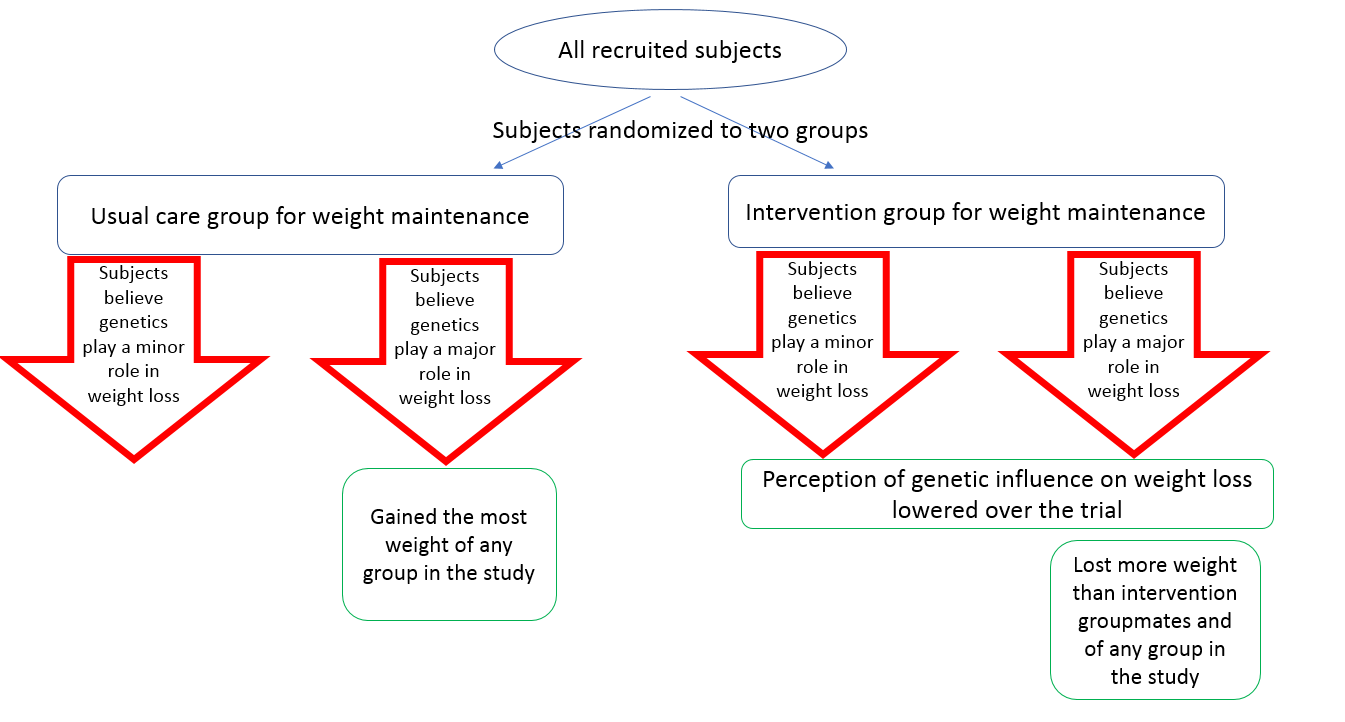 Catherine Briggs, MSc As a customer of a direct to consumer genotyping company, I was approached during New Year’s resolution season to be a participant in a study looking at the genetics of weight loss. I won’t bore you with the study design details, but I was randomly assigned to the “same diet, increased exercise” group. To comply, I’ve had to increase the duration and intensity of different types of exercise and answer a weekly survey about diet, exercise, and other habits-- all of which I had to admit to doing (or not doing) week after week. While filling in the bubble designating ‘two to four times a week’ for how often I consumed dark chocolate for the sixth week in a row, I reflected on the current literature investigating the influence of genetics on health and fitness. In the most recent, and perhaps largest study of its kind, Gardner and others addressed the very question I posed to myself. The human genome is composed of >3 billions base-pairs (designed by the A, C, G, T letters) and the sequence of these base-pairs is >99% identical from one individual to another. The location in the genome where some individuals may differ to another are called “genetic variations” and the most common type of genetic variations are single nucleotide polymorphisms (SNPs). They conducted a study like most prior genetics studies, examining how a combination of SNPs affect weight loss while dieting. Based on a previous study showing evidence that a ‘properly matched’ diet based on SNPs located in three genes (PPARG, ADRB2, and FABP2) improves weight loss over non-matched diets, this group followed over 600 subjects for a year after randomization into either a healthy low-fat or low-carbohydrate diet. Genetic status was blinded from the researchers and subjects during the trial. Subjects took part in group discussions and information sessions to help them adhere to their prescribed diet and were given the general spiel about reducing sugar, maximizing vegetables, and regular exercise. At the end of the year, the researchers found no interaction between genetics and diet on weight loss. There were also no differences in weight loss between the two diets, regardless of genetic status. A 2016 study looked at perceptions of genetic influence on weight, an uncontrollable attribution, and their weight maintenance as a secondary analysis to Shape program trial. The intervention group received personal counseling and a gym membership among other strategies for weight gain prevention. The usual care group had no additional services outside their primary care providers. Genetic information wasn’t collected from the subjects, only their personal beliefs about how genetics affect weight status and loss. The figure below details the final conclusions of the paper. Participants with high genetic attribution in the intervention group lost more weight than any other sub-group, while the usual care group participants with high genetic attribution gained more compared to any other sub-group. The interaction between the study arm and genetic perceptions played a significant part in weight status at the end of the trial. Secondly, the average genetic attribution for weight loss of participants in the intervention group decreased during the 12-month study. So perhaps it is not only genetics, but our own perception of them that determines individual outcomes. One can find a wealth of studies looking at this same question. Your conclusions may be different than mine. But, if you’re looking for a magic secret for weight loss, genetics may not be the holy grail; changing lifestyles and habits are equally difficult regardless of your individual gene mutations. I believe there is no substitute for a well-rounded diet and regular physical activity, but perhaps one’s own beliefs about the influence of genetics is enough to alter personal weight-loss outcomes. As is often the case in science, more well-conducted and verifiable research is needed before the first (or fifth) step of weight loss programs become a genotype report.
0 Comments
Your comment will be posted after it is approved.
Leave a Reply. |
©2017 WeighingInBlog. All rights reserved. 401 Park Drive, Boston, MA





 RSS Feed
RSS Feed

